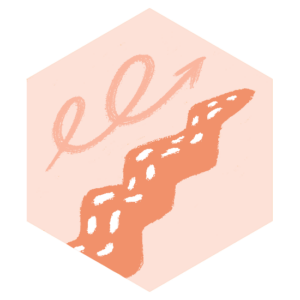What happens when you let the CUCo Board dream of CUCo in 2030? Sylvia Brugman, then CUCo Board member, imagined the following in late 2021.
The Centre for Unusual Collaborations (CUCo) started to germinate in the minds of 9 young academy members in the summer of 2020. In the middle of a pandemic, enthusiasm grew for the idea to challenge the dogma of academic life. Given card blanche by visionary rectors wanting to give young scholars a chance, the young academies grabbed the chance with both hands, and lifted off.
At that time, academics were still suffering from years of neoliberalism that had shaped the academic world into a number crunching, competitive, PhD factory in which feelings of failure and burn-out were widespread. But on the surface of this scorched earth a small seedling started to be nourished and grew.
The young academies of the four (now world-wide top ranking) universities came together and discussed what was needed in order to revolutionize the system. Cooperation over competition, teamwork over individualism, societal impact instead of H-index, curiosity and enthusiasm driven research over short-term economically driven research. Driven by the buzz of the new Recognition and Rewards initiatives and the widespread call for change among academics, the team went for ‘Business as unusual’.

It seems ages ago that the universities financing system (the yearly cycle!) and TT credits system prevented teams from moving forward, limited by time and rewards. Driven by societal changes and the little spark of the CUCo, the universities became one organism, breathing together for a brighter more sustainable tomorrow, trusting their employees to be intrinsically motivated, no longer looking for the sheep with five legs.
Students enliven the Nest’s collaborative projects; their internships are preparing them to work in this interdisciplinary context and listen and create together as part of their master program. Students still remember the time that all the internships provided were purely specialisations and individual assignments, mainly preparing them for PhD positions in specific fields. Now they train themselves to get skills needed for academia, companies, ngo’s and governmental agencies of today and the future.
Now, we can look back at the history of this thriving centre, the CUCo’s Nest: a physical space that provides training for all that want to embark on performing interdisciplinary research. Quickly the CUCo’s Nest became a testing ground for the visions and academic discussions surrounding Recognition and Rewards. We found ways to not only talk the talk, but walk the walk and really give room to everyone’s talent. Inspiring workshops and public lectures, games and creative space. Starting off as a centre financed by the four universities, now, it is financed by the ministry of research and education directly, since they realized money spent here had the biggest societal impact. Government agencies, municipalities, ngo’s, companies and non-profit organizations know the way to the CUCo’s nest and use the expertise of its fellows and its infrastructure to embark on solving different challenges.
PhD-students and postdocs spend part of their time (around 5% of their job) learning about interdisciplinary research within their university graduate school training and help the unusual collaborations of their choice by providing their viewpoints and expertise. Small short term projects within UCo projects are dedicated to be performed by these PhD students and postdocs with much enthusiasm, creating a breeding ground for future scientists and scholars shaping interdisciplinarity.

Assistant, Associate and Full professors are part of the Centre for Unusual Collaborations. Some are appointed on UCo grants for some amount of their time. Others take a sabbatical at the Nest for 3-6 months. Some choose to focus full-time on the shaping of new platform structures to enable interdisciplinary interactions. These specialists have spent a career on a specific research topic and now want to provide their expertise to broaden the horizon of themselves and others (reminiscent of the university professors). Others spent <15% of their time in the Centre providing valuable input on one or several collaborations and are rewarded for doing so at their university and in their department. Specialists on multi- and interdisciplinary research help shape the training and workshops provided by the CUCo and perform meta-analysis of the process to measure success and adjust methods and focus when necessary, based on scientific evaluation.
One important step the university has made on request of CUCo is that time is actually made available within the working week, indicating the importance of this work. It is not something you do on top of all the other work as a hobby, it is an integral part of the job. Staff members can indicate him/her/they-selves on what criteria he/she/they wants to be judged in order to move up the academic ladder. Universities have changed from a system of quantitative measures to select to a system in which staff members, when hired, are trusted and supported in their personal and academic development. Staff are stimulated to use their strengths to shape their career, instead of trying hard (and sometimes in vain) to patch up their weaknesses. In contrast to times long gone, interdisciplinary work and generalists now are appreciated as an important pillar of academic life, next to the academic specialists. These generalists have equal chances to specialists to become professor. Many more researchers and scholars stay at the university, leading to less loss of talent and a more diverse population. An important step in the completion of this transformation was the realization that reshaping the work division at the university freed up a lot of the staff’s time. By providing more support in the form of lecturers, teaching and office assistants more people found a job at university and processes were professionalized. This could of course not be done without the visionary leadership of our government that greatly increased the budget for higher education to compensate for the years of decreased spending.
Today, at our 10 year’s anniversary we are proud to have been part of CUCo and we would like to end with the wise words of Dolly Parton:
‘If you don’t like the road you’re walking, start paving another one.’